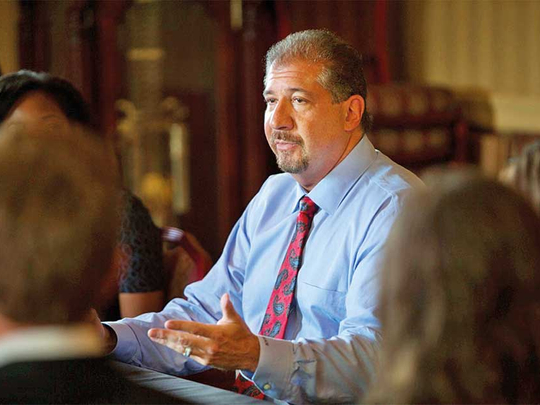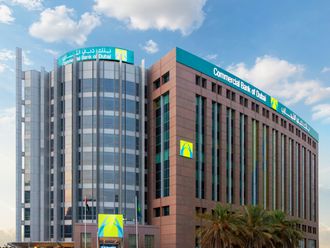
Dubai: Following the oil price decline over the past three years, GCC countries have been introducing a slew of fiscal reforms. One of the key areas is tax reforms. While the tax reforms in the region are important in revenue augmentation for governments, it is just one element of reforms the region needs to pursue, Mark A. Weinberger, global chairman and CEO, EY (formerly Ernst & Young) told Gulf News in an interview.
“The GCC region has some of the lowest corporate tax rates globally, no payroll taxes — and with the exception of a low rate of customs duties of 5 per cent, there have been no other material indirect taxes. So introducing both direct and indirect taxes can contribute substantially to revenue in the region,” said Weinberger.
But he believes driving sustainable change can’t only be about augmentation — it has to be about diversification, too. A recent EY report ‘Digging beneath the surface’ found that if the GCC countries were to achieve the average level of OECD diversification, this would correlate to an increase in real GDP of 1.6 per cent or an additional gain of up to $17.7 billion (Dh65 billion).
There have already been successful initiatives to diversify across the GCC leading to promising growth in sectors like construction, transport, telecoms and manufacturing. But with estimates that GCC government revenues are down from 46.5 per cent (of GDP) in 2013 to 32.8 per cent in 2016 — there’s a real need to move faster and be more proactive.
“This opens up the opportunity to drive some really positive changes. So, some of the really relevant things — alongside tax reform — are initiatives that would support diversification. Such as shifting the role of government from operator to investor; opening up to greater competition; more investment scrutiny and greater governance and integrating the GCC into a common marketplace with strong, harmonised legislation,” he said.
If the GCC were to become a single market, it would be the ninth largest economy in the world today — similar in size to Canada and Russia, and just behind India. And if it could achieve 3.2 per cent annual average growth, by 2030 it could be the world’s sixth largest economy.
VAT & direct taxes
Weinberger expects that implementing a 5 per cent value added tax (VAT) will help to narrow the fiscal gap, though the tax rate of 5 per cent is still a low rate compared to developed economies, lower than the 10 per cent favoured by the IMF.
“I don’t think anyone sees VAT as the only solution. We’ve seen some GCC states relook at subsidies on utilities and fuel, for example. Excise duties are also going to be introduced later this year on tobacco and sweetened soft drinks — and more products could be included as time goes on,” he said.
A heavy reliance on hydrocarbon revenues means the tax burden has been very light across the GCC, relative to other jurisdictions. The non-oil tax burden as a percentage of GDP for the GCC is about 2 per cent. That compares to a figure in the mid-thirties for the OECD or G7 average, which just shows how much room there is, in theory at least, to increase. So far, four of the GCC states already levy corporate taxes, albeit at a low rate, though it’s unlikely, in the short term, that personal income taxes will be introduced.
Weinberger said that to position the region’s attractiveness in terms of tax sells it short. EY published a report called BaroMed 2017 that looks at the attractiveness of the Mediterranean, Middle East and Gulf region for foreign investment. It found that although FDI was falling, the Gulf was the second most attractive region in that group for investors because of opportunities in the services sector and its diversification strategies. Nearly half of the respondents surveyed thought the region’s attractiveness would improve over the next three years.
“We also asked investors to name the six most important things to improve the wider region’s attractiveness — and tax wasn’t on the list. They highlighted stability, access to talent, digital and hard infrastructure, energy efficiency and easier access to financing. This underscores that alongside any tax reform, efforts to support diversification are very important,” said Weinberger.
He believes that while it is important to identify those sectors that have most potential to stand on their own feet and that can create genuine jobs outside the public sector, it also requires actions to attract investors to those new sectors — cutting red tape, making it easier for foreign companies to bring in capital and expertise, and investing in local training and skills.
“It’s not just about foreign investors, there’s a big opportunity for governments to invest at home. Currently around 23 per cent of local Sovereign Wealth Funds are invested in the GCC rather than abroad — so there’s a huge opportunity to accelerate home-grown investment too,” he said.










